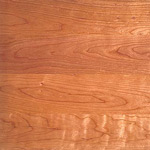For a quicker response, please send all inquiries
via info@canfloor.com or
text to
416-735-0075.
| Monday - Friday | 10:00 am - 7:00 pm |
| Saturday & Sunday | 10:30 am - 4:00 pm |

Scientific Name: Prunus serotina
Other Names and Species: American Cherry, North American Cherry Not to be confused with other domestic and exotic species with similar names, such as Brazilian cherry, or jatoba (Hymenaea courbaril), which is extremely dense and strong and has a different color and texture compared to black cherry.
Origin: North America
Appearance: Prized for its rich color and fine graining, black cherry is commonly seen in American cabinetry and furniture. The fine, satiny texture of the wood is uniform and frequently wavy, with distinctive gum veins and pockets. The lustrous heartwood ranges from light to dark reddish brown, constrasting sharply with the sapwood, which may be light brown to pale with a light pinkish tone; however, between boards there may be significant color variations. Black cherry is extremely light-sensitive, so there is a strong color change and darkening over a short period time when the wood is first exposed to light.
Properties: A strong but moderately hard wood with excellent shock resistance, black cherry is generally considered too soft for an entire floor; mainly it is found in borders and accents.
Workability:Black cherry has good machining, sanding, and holding ability, and is high in bending strength.
Principal Uses: Second only to black walnut in value as a fine hardwood species, black cherry is commonly found in fine furniture, veneers, and wood flooring borders and accents. It is also used for printing and engraving blocks, professional and scientific instruments, and decorative items.
